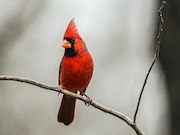
MONDAY, July 16, 2018 — If you think birds just chirp merrily all day, consider this new finding: Worldwide, they eat up to 551 million tons of beetles, flies, ants, moths, aphids, grasshoppers, crickets and other insects every year.
“The global population of insectivorous birds annually consumes as much energy as a megacity the size of New York. They get this energy by capturing billions of potentially harmful herbivorous insects and other arthropods,” said study leader Martin Nyffeler, from the University of Basel, in Switzerland.
Forest-dwelling birds gobble up 75 percent of all the bugs eaten by birds, while about 110 million tons are eaten by birds in savannas, grasslands, croplands, deserts and the Arctic tundra, the researchers said.
The study was published online July 9 in The Science of Nature.
“The estimates presented in this paper emphasize the ecological and economic importance of insectivorous birds in suppressing potentially harmful insect pests on a global scale — especially in forested areas,” Nyffeler said in a journal news release.
“Only a few other predator groups — such as spiders and entomophagous insects (including in particular predaceous ants) — can keep up with the insectivorous birds in their capacity to suppress plant-eating insect populations on a global scale,” he explained.
A previous study led by Nyffeler said that spiders consume between 441 and 881 million tons of insects each year.
But, “birds are an endangered class of animals because they are heavily threatened” by deforestation, farming, pesticides, pollution and climate change, he said.
“If these global threats cannot soon be resolved, we must fear that the vital ecosystem services that birds provide — such as the suppression of insect pests — will be lost,” Nyffeler said.
More information
The American Bird Conservancy has more on birds.
Posted: July 2018
Source: Read Full Article
